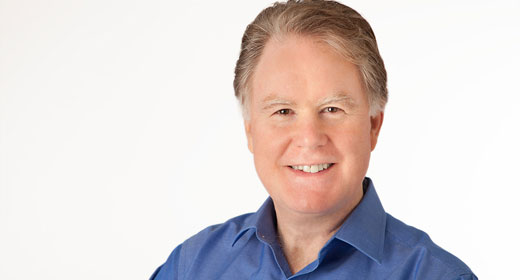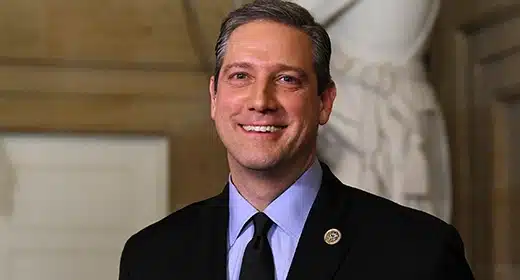Donna Quesada: Well, it’s nice to see these practices… I do teach Kundalini yoga, and we do a lot of breath work,
and it’s a joy for me to see how these practices really can help. You have a very busy day, I’m sure… You know, that it doesn’t conflict with any existing practice. I remember when I first shared these things with my own students… that was 20 years ago, and in those days there was a lot of confusion, and people thought it was something religious. But now we understand that it doesn’t matter what religion you belong to. These are practices that are good for your nervous system and they help with anxiety and depression. And they go hand in hand with whatever your private religion happens to be. And I thought to myself, if only we could see that as a nation and bring these things into the classroom.
Tim Ryan: Yeah, a hundred percent. I mean, it’s like, science based. The science is there, the biology’s there… we’re really starting to figure it out. And I think there’s going to… continue to be penetration with a lot of these practices, because you’re seeing ’em, in the military with the Navy Seals, you’re seeing them with athletes now. Like, you can’t, talk to an Olympic athlete or a really highly functioning professional athlete that isn’t doing some kind of centering, some kind of breath work, some kind of… Yeah. You know, mindfulness practice. I’m an Ohio State fan, obviously, being here in Ohio, but… the Michigan quarterback has a big meditation practice and literally sits at the gold post before a game… the quarterback!… and does mindfulness practices. You know, and I… one of the reasons I got into this was Phil Jackson, who was the coach of the Chicago Bulls back in the day. I was just…
Donna: And the LA Lakers.
Tim: Yeah. And then the Lakers. That was a key that was foundational to his coaching… the body work, the meditation, the being in the moment kind of thing. And then you watch Kobe Bryant, you watch Michael Jordan, you watch Tom Brady, you watch these guys perform at that level, they’re completely present. And, that is an end result of the practice. And then, from the religious standpoint, really, I’m kind of an eclectic guy around this, but I love, like… Yogananda, like I’ve read like five Yogananda books that are out there, just absolutely adore him, and his relationship with Jesus. You know, he was traveling America with the cross around his neck. Yeah. Like, that’s some cool shit right there. I love that. You know?
Donna: And Jesus was a real yogi, after all…
Tim: A hundred percent. And he’s got a great book that’s called The Yoga of Jesus. Yeah. Phenomenal book. Blow Your Mind. I tell anybody who really wants to kind of understand the teachings of Jesus, to look at it through that lens… super powerful. And opens the religion up and really gets it out of… I love going… I went to Catholic school for 13 years. I was an altar boy. I loved being Catholic, just part of my DNA, and in that book… I came from, like, my grandparents were praying the rosary. They would go to rosary groups. It was a very kind of meditative… social gospel kind of church that I went to, and schools that I went to, John F. Kennedy High School, our Lady of Mount Carmel High School.
And, Mount Carmel was kind of where Jesus was from. Like, it was his… this small little eclectic, super spiritual group of Jews was on Mount Carmel. So anyway, long story short, to watch that and to read that opened the religion up… to the ideas of fear. And the ideas of love trumping fear, and the love comes from the fact that we are one with each other… that spiritual recognition that that we have. It’s like, super powerful.
So take these practices… and all of these different religions have some component of a contemplative practice. You look at, Richard Rohr, in his writings around Christianity and Catholicism… so, powerful. You look at people in the Jewish religion… they call the “jewbu”… that’s like, Jewish-Buddhist, kind of… opens the stuff up. And that’s, again, that’s a culture shift, right? We get to that point. The policies will just flow. We’ll be good. Everything will be fine if we can get to that point.
Donna: Well, I share your interests. I have an Italian Catholic grandmother, so I also love the imagery of the Catholic church, and Mary, and all of these things. But I also have a love of Yogic wisdom. And yeah, so I’m gobbling up what you’re saying and relating to it very much. And I love the idea that they can be inclusive. For me, I always saw them as different boats going down toward the same ocean. And we can… why can’t we wave to each other and say, “Oh, you’re on that path… Cool.” You know, “I’m over here… see you there!” And to me, it’s sad that there’s so much divide between the different paths, as if they have to be exclusive, but they don’t.
Tim: Right. Well, you’re riding on the same river. You’re riding on the same water. You’re just in a different boat. But if you dive in, you’re in the same body of water.
Donna: It almost makes my next question moot. We like to explore the balance between individual awakening and social awakening. But it’s, if I’m understanding what you’re saying properly, one takes care of the other. When we take care of ourselves, it does take care of the activism, and the notion that we can become awakened collectively, doesn’t it?
Tim: A hundred. Yeah, absolutely. And at the collective consciousness, right? Of the, body politic, like… we were talking about with the world War II generation, there was an elevated level of awareness of the connection. We’re all in this together. We’re all in the cheese line together. We’re all going to war together. The women are all in the factory together. Everybody comes back to rebuild the communities together. Like, there was a real togetherness there… that was a heightened level of awareness of the deeper connection that we have. And so, the results of that were social security, Medicare, Medicaid, civil rights legal aid… everybody deserves a lawyer, you know, urban renewal, which didn’t turn out as great as we wanted it to, but it was a good idea to like, how do we reinvest back into that kind of thing?
And you could have the argument of like, well, maybe it was too much government, or maybe it should have been a little more private sector, and that’s fine. That’s like an honest, conversation we should have. But the idea was, we’re connected and there’s a problem. How are we going to fix it? And right now it’s like, we ignore problems. We don’t care if there’s problems. Not my problem. So this is… going to go on my merry way here. But that, yeah, so your personal experiences and what we’re talking about, your personal practices, elevate your awareness. And if we could get more of people in… John Kabat Zinn talks about this a lot, like, how that will affect the body politic, right? Your own body, your own mind, your own awareness, will affect the awareness of the body politic, just by you doing you and hopefully, having a little impact around you. And if everybody does a little bit, then we can have a tipping point.
Donna: And do you think that this also, by default, influences the imbalance between the kind of overarching patriarchal element in politics and in the world? There’s been this kind of dominating, masculine energy, so to speak, that I think shapes the way we do politics and the way we shape our educational system, and so forth.
Tim: Yeah. I mean, for sure. You know, it’s the… I mean, we’re still dealing with the imbalance. I mean, how long has it been since women have even had the right to vote? Its not been that in the grand scheme of the history of our species… it’s not been all that long. And so, you’re still going to have remnants of that. And so, that’s why you’ve got to… and businesses are starting to realize this… and I think we’re seeing it in government. I served in Congress with Nancy Pelosi, as speaker of the house at the highest level and women who are committee chairs… female vice president now. Lots of women, female governors… So it’s happening. But I think it is, kind of, still reflective in the system of that old system.
And that’s part of what’s rotting too, though. I mean, that system is no longer able to… aggressive system that… made its way into the food system, and all these other broken systems, the penal system, the criminal justice system, where we have so many people in prison for really no good reason, non-violent crimes and all the rest, and how brutal it is. And then people get out and we wonder why they’re so traumatized, and then they end up doing, committing another crime and going back in. That’s like that very punitive system. So a little more of a, I guess, a feminine, or like, rehabilitation approach certainly, is helpful. And I think , we’re like underneath the surface… I think we’re really starting to get there.
And they’re taking positions of power. And many corporations know, we need some women in this room because a room full of guys… you need some balance. You just… guys need balance. And I’m a guy, like, I’m a guys’ guy. I’m a hundred percent a guys’ guy. Like, I need my wife. My wife keeps me out of a lot of stuff because, she just keeps me straight. You need that balance. And again, in the body politic, in the corporate boardrooms, you need that, as well.
Donna: And what has been your greatest achievement in the work that you do?
Tim: You know, it’s hard not to kind of acknowledge the Affordable Care Act, providing healthcare for everybody in the country. This… I was one of many on the front lines of that battle. And, that’s a big accomplishment. You know, I know it’s not perfect and there’s all kinds of issues. But for a hundred years in this country, we’ve tried to make sure everybody at least has some basic healthcare. You know, and we were able to do that. That’s a big accomplishment. And I was proud to be a part of that.
And then a lot of stuff back home in my congressional district… we really have been able to retool an old rust belt area with… we’ve got electric vehicles we’re building, we’ve got battery plants we’re building, you know, we’re moving away from like, coal and oil to natural gas, which I know some people don’t necessarily like, but it’s, 50% cleaner than coal and 30% cleaner than oil.
And so, we’re like, that’s the 30, 40 year plan. So we are on the cutting edge of a lot of this stuff here in our area. And I take a lot of pride in that. I’m proud of what we did.
Donna: Oh, absolutely. Healthcare in this country… I mean, I’ve heard it said that people traveling here are afraid of getting into an accident or something like that because you could lose your house.
Tim: Yeah. That should never happen in this country.
Donna: I agree. In our last moments together, Mr. Congressman, is there anything that I didn’t ask that I should have. or that you’d like to share with our viewers?
Tim: This, has been one of the more interesting interviews I’ve done in a long time. So I think we covered a lot of ground, and I really appreciate all the work that you’re doing to bring this kind of mindset to the world. And, we’ve just got to keep it up, we’ve got to keep pushing it. And I think honoring the men and the women who are in this vein… we stand on their shoulders, and they may not always be the people that you think, but like, having this broader conversation about connection, the broader conversation about trauma, and who are those leaders over the years in our country that we honor because of that? And I get the whole idea of pointing out where people have done wrong over the years, but if we don’t find those leaders who, in the midst of terrible circumstances like Lincoln… he’d say, well, he wasn’t a perfect guy, or Thomas Jefferson wasn’t a perfect guy.
Or, but like, in that moment of time, we’ve got to be able to pull ourselves out of the present moment and place ourselves there. And for them to establish a country that they knew was imperfect, but allowed… had the infrastructure in place to become a more perfect union. That’s to be honored and President Kennedy with all his flaws, but look what he was like, pushing us towards and honoring that, because that’s where the juice is in the United States. And if we focus on the negative all the time, we’re missing the really juicy, powerful aspects.
Everyone’s human, everyone’s flawed, we’re all sinners. But we want to build on that stuff. And I think, we’re in a moment in time, and it’s the social media and all this other stuff that keeps us locked into a, not into the spiritual dimension of life that President Kennedy lived in, where we’re caught in the sewage of the fight all the time, and there’s no, where are we going? There’s no America 2.0. So, I would just encourage everybody to help each other in a nonjudgmental way, to get to that point.
Donna: Well, we make that mistake in spiritual circles too. We expect our teachers to be perfect, but we’re all human. Yeah. And I think that what those people… you spoke about Washington earlier, and of course they’re imperfect, but there was a humility there that I feel is not there today, in today’s leaders. And I have to say on a personal note, your concession speech really exemplified that humility that I feel is missing. And we’re going to post that under this interview. It was such a model of what we should be seeing, that we don’t see enough of anymore. You know, that idea of Washington stepping down, all of that stuff, isn’t there a component of humility there?
Tim: Oh my gosh. Absolutely. And, it’s like, humility and audacity, like, I don’t know, all rolled into one, and the concession speech… it was like, to me… it was like, obviously I spent 18 months of my life away from my family trying to achieve this thing to have an impact for my kids, for my family, for my community and like, to like walk up to the stage with my, our three kids were there, 2019, and our little guys ate and they’re all looking at me. And, all I told myself is, you got to do it the right way for them, because I want them to be… I want to try to model for them more so than like, for you or the country or anybody else. Like, because one day they will lose at something.
And I want to show them how to handle that in the best way possible. And, I think that like, I don’t know, not just to be in that space where you can say, this isn’t about me. You know, this is about showing others how to do it and not telling them how to do it, but showing them how to do it. And I think too often political leaders will tell you how to do things and not show you how to do things. And so, I hope in some way, I contributed.
Donna: Well, bravo for that. I mean, I… that should go viral. I remember our founder, David Welch, sent that to me and I played it for my partner, and it was such a model of what we’re missing.
Tim: Thank you.
Donna: Well, Mr. Congressman Ryan, thank you again for spending this time with us. We are so grateful for the work that you’re doing and bringing this awakened perspective into the political field and into this world that can be anything but spiritual at times.
Tim: Well, thank you. Thank you for having me.
Read and Watch Part 1 Here: Awaken Interviews Congressman Tim Ryan Pt 1 – How Do We Shift the Culture From Disconnection To Connection?
Read and Watch Part 2 Here: Awaken Interviews Congressman Tim Ryan Pt 2 – People Want to Know You Care










































